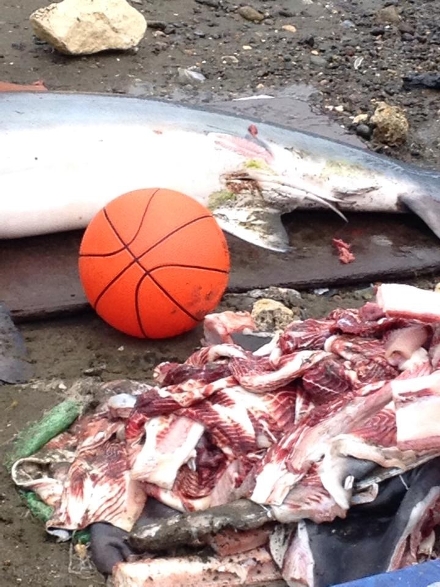BFAR ‘unaware’ of Talisay shark trade, starts probe

Thresher shark trade is very rampant in Tangke, Talisay City. A resident of Talisay City shot these photos last month where fishermen mutilate, skin at the shore in sitio Rattan and Magay in Tangke, Talisay. The shark is sold for at least P50 per kilo to a middleman. (CDN PHOTO/ CONTRIBUTED)
The Bureau of Fisheries and Aquatic Resources (BFAR) 7 said it would start looking into the trade of shark meat in Talisay city after the activity was reported in Cebu Daily News.
BFAR 7 Regional Director Andres Bojos said he immediately sent a team to the coast of barangay Tangke yesterday after they read CDN’s front page story “IHO’ IN TALISAY” about sharks being captured, butchered and sold on the shoreline of barangay Tangke.
“We sent a team to confirm the report of thresher sharks being sold there but it was negative,” Bojos told CDN.
He admitted that fishermen they talked with may have clammed up when they knew the team was from BFAR.
Talisay City, Mayor Johnny V. delos Reyes ordered the Talisay City Police Office to investigate the activity.
“I heard about that before, but I still have to verify it,” he said.
In Cebu City, Councilor Nida Cabrera said she would file a resolution on shark conservation in today’s regular session.
“We want to prohibit the catching of endangered species of sharks in the city since there is no local ordinance for it. We don’t want to see sharks being sold in markets in our city,” Cabrera told CDN.
Cabrera said she also wants to commend Philippine Airlines for its recent move to stop the transportation of shark fins on its flights and to request other companies to do the same.
Shark fins are valued for exotic ‘shark fin soup’ in Chinese restaurants here and abroad. The liver oil is also valued as a medicinal supplement while the meat is being harvested as a cheap source of seafood.
A CDN news team visited sitio Magay, in Tangke last Monday and spoke with fishermen who described in detail how they woud capture sharks by hook and line, then cut them up and sell the meat and fins to local wholesale buyers for P50 a kilo.
CDN was earlier sent photos of the activity in the shores of barangay Tangke by a resident who asked to remain unnamed.
‘Witnesses come out’
Bojos tried to ask CDN to name the informant and provide contact information. “It was negative when we went there. What can we do? We can’t continue to speculate. If there is somebody who confirmed it, then pakita (show up) and gawas (get out) so that we can check,” he said.
He said the informant could execute an affidavit of what he/she saw in order to help the agency.
Bojos said the immediate responder in this kind of case should be the local government.
“If there are reports like this, they should relay it to the LGU or to the police,” he added.
A 2002 Cebu provincial ordinance already bans the capture and sale of thresher sharks which are endemic in Malapascua Island in northern Cebu. The Provincial Board on Monday moved to expand the ordinance to include three species of hammerhead sharks, which were recently included in the “red list” of the International Union for the Conservation of Nature (IUCN) as endangered or vulnerable species.
The Talisay fishermen interviewed by CDN said they knew that whale sharks locally called “butanding” or “tuki” can no longer be hunted, but said they didn’t know it was illegal to catch other types of sharks.
The photo of a butchered shark published in CDN was that of a thresher shark.
Bojos of BFAR said fishermen should already know which species of sharks are prohibited since consultations were done when the ordinance was crafted.
“In fishing, we can’t really restrict fishermen from what they actually catch. Ang pagpanagat, chamba chamba lang na (fishing relies on luck). But if the certain species they catch is regulated by law, then fishermen are encouraged to avoid catching them,” Bojos said.
Bojos said BFAR hasn’t received reports before of shark catching from the Talisay City government.
He said he’s confident Talisay city knows about what’s prohibited since their fisheries technician Apple Jane Into was “active.” /with Correspondent Michelle Joy L. Padayhag
Disclaimer: The comments uploaded on this site do not necessarily represent or reflect the views of management and owner of Cebudailynews. We reserve the right to exclude comments that we deem to be inconsistent with our editorial standards.
